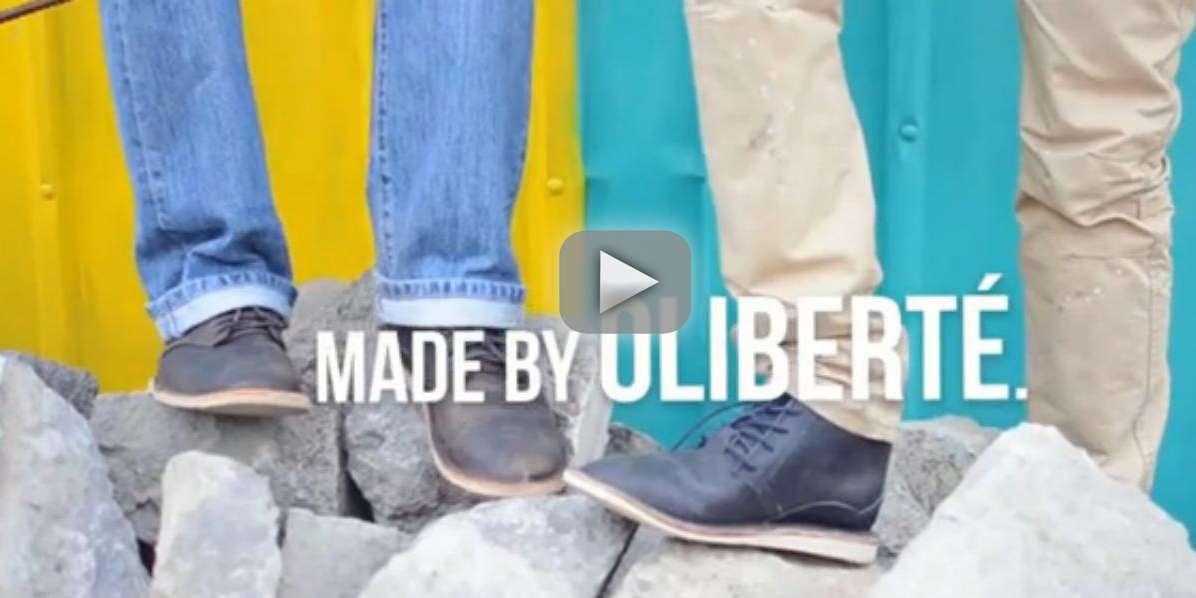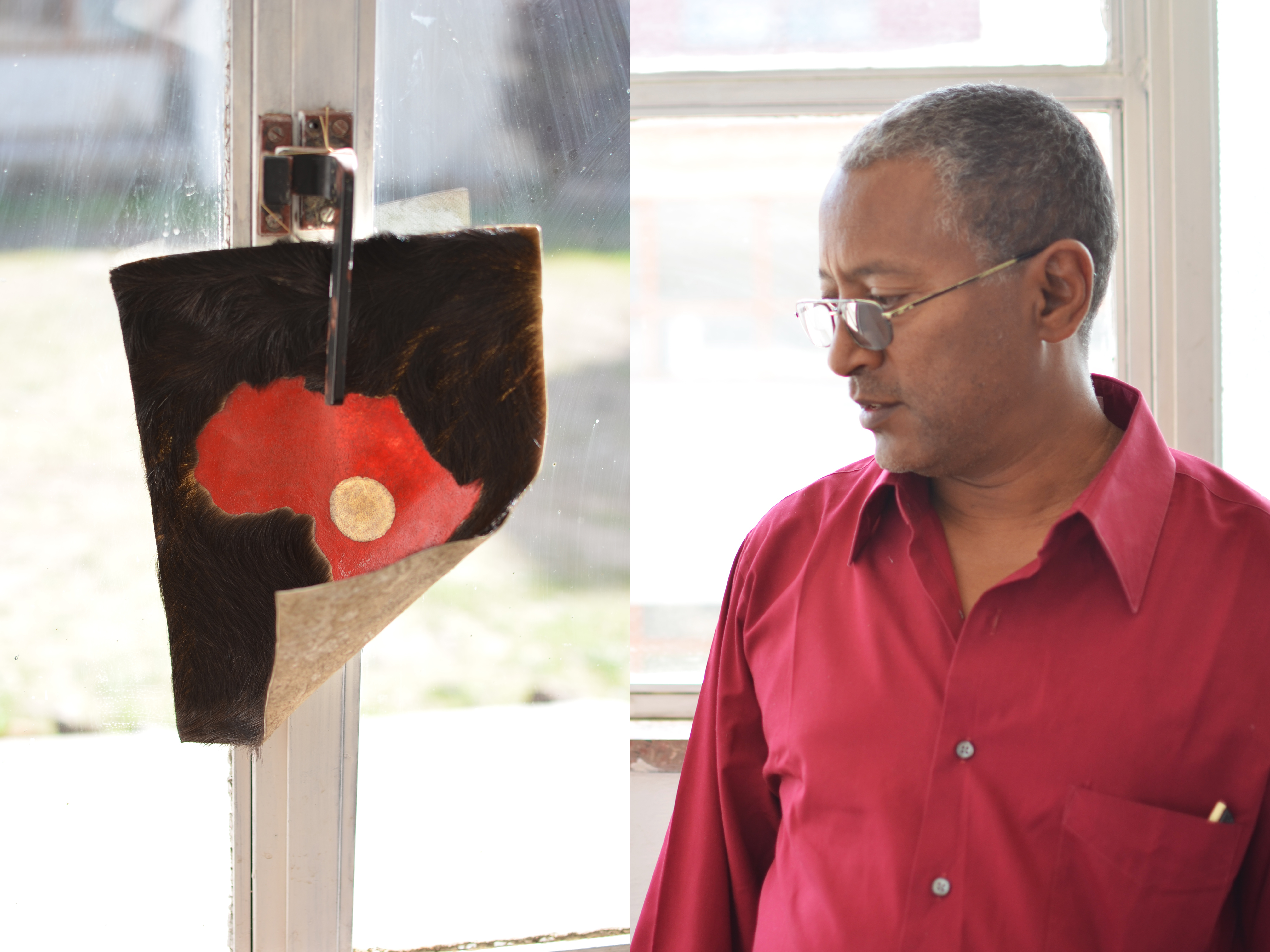 BIG NEWS, F/W 2012:
BIG NEWS, F/W 2012: This August, we took a huge step.. We debuted our very own Oliberté shoe manufacturing factory in Ethiopia. Set up by our General Manager Feraw and his team, this factory gives Oliberté the chance to ensure the highest level of rights for our workers, guarantee the quality of product, and lead the way in manufacturing in Africa.
Oliberté launched in 2009 with the dream of sharing pride in Africa and providing the North American market access to its incredible materials and talents while supporting sustainable jobs. It wasn’t all an easy journey. We were lucky enough to find great people, great sources of rubber and leather, and factories already at work in Ethiopia that treat their workers well and make outstanding product. Through partnering with these factories, we were able to find our feet (literally and figuratively) and support work for hundreds of workers.

Locks on the entrance to the main door to the factory.
This season, we were ready to take it one step further. Now, with our very own factory, Oliberté employs 51 full-time team members in Ethiopia, 60% women. These team members are in everything from admin to sole-making, stitching and pattern making to quality inspection. We pay fair wages, whether or not there is electricity to make shoes that day.. We pay overtime. We offer maternity leave. To be fair, Ethiopia provides great guidelines already in worker benefits and treatment and what we do today is a starting line. We aspire to take these benefits above and beyond as we grow, offering educational funds for workers and their families, extended health benefits, and retirement fund. These aren’t things that come easily, but they’re things you can help us accomplish.
All Fall/Winter 2012 shoes were made in this very factory. If you’ve already snagged a pair, you have a piece of our history on your feet.
In the next year, we aim to have over 100 full-time Oliberté team members in Ethiopia, as well as continue to support jobs in agriculture, the leather industry, rubber harvesting, and rubber processing. Over the coming 10 years, we aspire to provide 10,000 jobs in manufacturing. And our greater, sky’s-the-limit goal is to see 1 million jobs exist in footwear manufacturing in Africa, encouraging colleagues and competitors to make shoes in Africa by seeing Oliberté’s model and success. Our own factory is still just a step, and we can’t wait to share every goal we achieve along the way with you.

Already, our GM Feraw has created a program that enables workers at our factory to advance internally, hooking them up with further education in leather work if they are so interested and motivated. We support our staff and their families. We make incredible product with materials harvested and handcrafted in Africa. Our shoes and bags are quality – made with skill and made to last. We’re eager to keep you informed as you adventure along with us on this journey to share the pride and talent in Ethiopia and Africa.
Always made in Africa. Now, made by Oliberté.
Watch the video
here.
 BIG NEWS, F/W 2012: This August, we took a huge step.. We debuted our very own Oliberté shoe manufacturing factory in Ethiopia. Set up by our General Manager Feraw and his team, this factory gives Oliberté the chance to ensure the highest level of rights for our workers, guarantee the quality of product, and lead the way in manufacturing in Africa.
Oliberté launched in 2009 with the dream of sharing pride in Africa and providing the North American market access to its incredible materials and talents while supporting sustainable jobs. It wasn’t all an easy journey. We were lucky enough to find great people, great sources of rubber and leather, and factories already at work in Ethiopia that treat their workers well and make outstanding product. Through partnering with these factories, we were able to find our feet (literally and figuratively) and support work for hundreds of workers.
BIG NEWS, F/W 2012: This August, we took a huge step.. We debuted our very own Oliberté shoe manufacturing factory in Ethiopia. Set up by our General Manager Feraw and his team, this factory gives Oliberté the chance to ensure the highest level of rights for our workers, guarantee the quality of product, and lead the way in manufacturing in Africa.
Oliberté launched in 2009 with the dream of sharing pride in Africa and providing the North American market access to its incredible materials and talents while supporting sustainable jobs. It wasn’t all an easy journey. We were lucky enough to find great people, great sources of rubber and leather, and factories already at work in Ethiopia that treat their workers well and make outstanding product. Through partnering with these factories, we were able to find our feet (literally and figuratively) and support work for hundreds of workers.
 Locks on the entrance to the main door to the factory.
This season, we were ready to take it one step further. Now, with our very own factory, Oliberté employs 51 full-time team members in Ethiopia, 60% women. These team members are in everything from admin to sole-making, stitching and pattern making to quality inspection. We pay fair wages, whether or not there is electricity to make shoes that day.. We pay overtime. We offer maternity leave. To be fair, Ethiopia provides great guidelines already in worker benefits and treatment and what we do today is a starting line. We aspire to take these benefits above and beyond as we grow, offering educational funds for workers and their families, extended health benefits, and retirement fund. These aren’t things that come easily, but they’re things you can help us accomplish.
All Fall/Winter 2012 shoes were made in this very factory. If you’ve already snagged a pair, you have a piece of our history on your feet.
In the next year, we aim to have over 100 full-time Oliberté team members in Ethiopia, as well as continue to support jobs in agriculture, the leather industry, rubber harvesting, and rubber processing. Over the coming 10 years, we aspire to provide 10,000 jobs in manufacturing. And our greater, sky’s-the-limit goal is to see 1 million jobs exist in footwear manufacturing in Africa, encouraging colleagues and competitors to make shoes in Africa by seeing Oliberté’s model and success. Our own factory is still just a step, and we can’t wait to share every goal we achieve along the way with you.
Locks on the entrance to the main door to the factory.
This season, we were ready to take it one step further. Now, with our very own factory, Oliberté employs 51 full-time team members in Ethiopia, 60% women. These team members are in everything from admin to sole-making, stitching and pattern making to quality inspection. We pay fair wages, whether or not there is electricity to make shoes that day.. We pay overtime. We offer maternity leave. To be fair, Ethiopia provides great guidelines already in worker benefits and treatment and what we do today is a starting line. We aspire to take these benefits above and beyond as we grow, offering educational funds for workers and their families, extended health benefits, and retirement fund. These aren’t things that come easily, but they’re things you can help us accomplish.
All Fall/Winter 2012 shoes were made in this very factory. If you’ve already snagged a pair, you have a piece of our history on your feet.
In the next year, we aim to have over 100 full-time Oliberté team members in Ethiopia, as well as continue to support jobs in agriculture, the leather industry, rubber harvesting, and rubber processing. Over the coming 10 years, we aspire to provide 10,000 jobs in manufacturing. And our greater, sky’s-the-limit goal is to see 1 million jobs exist in footwear manufacturing in Africa, encouraging colleagues and competitors to make shoes in Africa by seeing Oliberté’s model and success. Our own factory is still just a step, and we can’t wait to share every goal we achieve along the way with you.
 Already, our GM Feraw has created a program that enables workers at our factory to advance internally, hooking them up with further education in leather work if they are so interested and motivated. We support our staff and their families. We make incredible product with materials harvested and handcrafted in Africa. Our shoes and bags are quality – made with skill and made to last. We’re eager to keep you informed as you adventure along with us on this journey to share the pride and talent in Ethiopia and Africa.
Always made in Africa. Now, made by Oliberté.
Watch the video here.
Already, our GM Feraw has created a program that enables workers at our factory to advance internally, hooking them up with further education in leather work if they are so interested and motivated. We support our staff and their families. We make incredible product with materials harvested and handcrafted in Africa. Our shoes and bags are quality – made with skill and made to last. We’re eager to keep you informed as you adventure along with us on this journey to share the pride and talent in Ethiopia and Africa.
Always made in Africa. Now, made by Oliberté.
Watch the video here.





